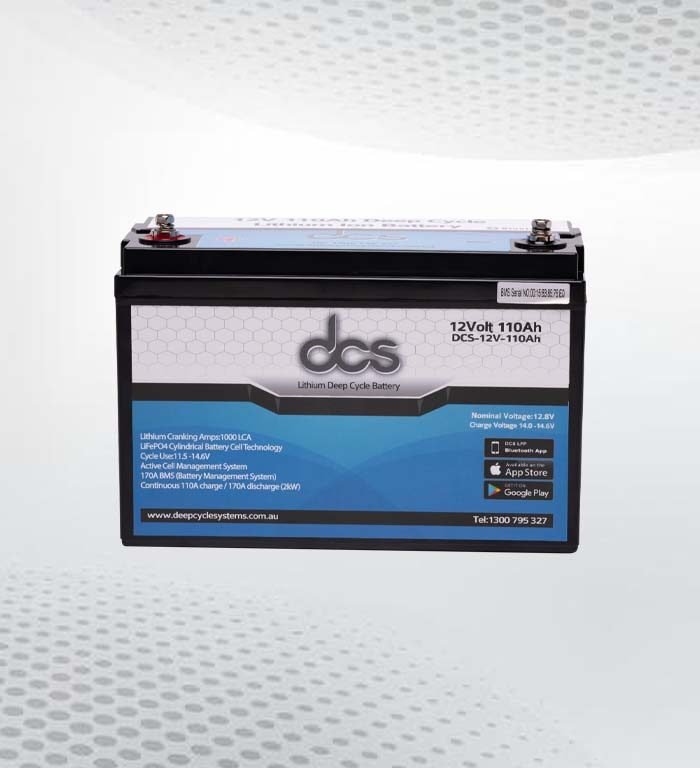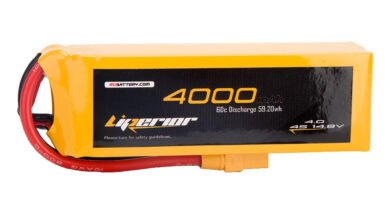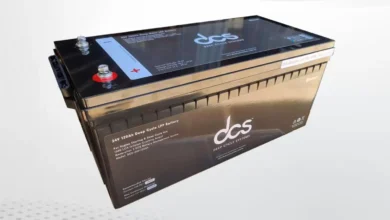48V Li Ion Battery: Reliable Power for Your Applications

In today’s fast-paced world, reliable power sources are essential for many applications. One such power source that has gained significant popularity in recent years is the 48V Li Ion battery
. These batteries offer a high level of efficiency, reliability, and versatility, making them ideal for a variety of uses. In this blog post, we will explore the basics of Li-Ion technology, the significance of the 48V Lfp battery, advantages in renewable energy systems, applications in electric vehicles, safety features, considerations, and the future of this technology. Whether you are powering portable devices or looking to enhance the performance of electric vehicles, the 48V Li-Ion battery is a reliable choice for all your power needs.
Understanding the Basics of Li-Ion Technology
Li-Ion batteries, short for lithium-ion batteries, stand out in rechargeable energy storage solutions due to their superior energy density, minimal self-discharge rates, and impressive lifespan. These characteristics stem from the fundamental workings of Li-Ion technology, where lithium ions move from the negative electrode to the positive electrode during discharge and back when charging. This flow of ions, enabled by a liquid or gel-like electrolyte, facilitates energy storage and release.
A pivotal feature of Li-Ion batteries is their ability to maintain a consistent voltage level even as the battery discharges, which is crucial for devices that require a steady power supply. The 48V variant capitalizes on these intrinsic benefits of Li-Ion technology, offering a voltage level that suits high-demand applications efficiently. The integration of advanced materials and engineering practices has further optimized the performance and safety of these batteries, enabling their wide-ranging application from portable gadgets to substantial industrial equipment.
The Significance of the Lfp Battery 48v
The LFP (Lithium Iron Phosphate) battery at 48 volts represents a significant advancement in Li-Ion energy storage solutions, especially for applications requiring robust and safe power sources. The distinctive characteristics of LFP Battery 48v chemistry offer unique advantages, making these batteries particularly noteworthy:
· Enhanced Safety:
LFP batteries are less prone to thermal runaway and overheating than other lithium-ion chemistries. This inherent stability reduces the risk of fire and explosion, a critical consideration for electric vehicles and residential energy storage systems.
· Long Life Cycle:
The LFP chemistry provides an extended lifespan, capable of enduring thousands of charge-discharge cycles with minimal capacity loss. This durability reduces replacement costs and creates a more sustainable energy storage option over time.
· Eco-Friendly:
LFP batteries contain no heavy metals and have a lower environmental impact during production and disposal, aligning with the growing demand for greener technologies.
· High Thermal Stability:
Capable of operating in a wider range of temperatures, LFP batteries maintain performance and reliability even under harsh conditions, making them suitable for outdoor or rugged applications. The 48V LFP battery stands out for its combination of safety, longevity, and eco-consciousness, offering a compelling choice for those prioritizing these attributes in their power storage solutions.
Advantages of 48V Li-Ion Batteries in Renewable Energy Systems
Integrating 48V Li-Ion batteries into renewable energy systems presents numerous benefits, enhancing both the efficiency and reliability of these green power sources. Here are the key advantages: –
· Increased Storage Capacity:
These batteries can store large amounts of energy generated from renewable sources, such as solar or wind, utilising green energy even when production is low, like during nighttime or on cloudy days.
· Improved Efficiency:
48V Li-Ion batteries have a high round-trip efficiency, meaning a greater percentage of the energy stored is available for use, reducing waste and increasing the overall system efficiency.
Scalability:
Due to their modular nature, these batteries can be easily scaled up to meet the growing energy demands of a household or business, making them a flexible option for expanding renewable energy systems.
· Longevity and Durability:
Their ability to withstand numerous charge and discharge cycles with minimal degradation extends the lifespan of renewable energy systems, ensuring a stable and reliable energy supply over a longer period. These advantages position 48V Li-Ion batteries as a cornerstone in the transition towards more sustainable energy systems, leveraging the full potential of renewable resources.
Enhancing Electric Vehicles with 48V Li-Ion Batteries
Electric vehicles (EVs) represent a pivotal shift toward sustainable transportation, mitigating the environmental impact associated with traditional fossil fuels. Integrating 48V Li-Ion batteries into EVs plays a crucial role in this transition, offering a blend of performance and efficiency essential for the modern electric vehicle market. These batteries provide the necessary power density to extend the driving range of EVs, a key factor for consumers considering the switch to electric. With the ability to recharge quickly, 48V Li-Ion batteries also address one of the common concerns regarding EVs: lengthy charging times.
Furthermore, their durability ensures that the batteries can withstand the numerous charge and discharge cycles typical in automotive applications, contributing to the overall longevity and reliability of the vehicle. This is particularly important as the automotive industry moves toward electrification, requiring batteries that deliver on performance and maintain their capacity over time.
Adopting 48V Li-Ion batteries in EVs also supports auxiliary systems fundamental to vehicle operation and passenger comfort, such as air conditioning, audio systems, and navigation. This ensures these systems can function efficiently without compromising the vehicle’s range or performance.
In the evolving electric mobility landscape, using 48V Li-Ion batteries is a testament to the industry’s commitment to innovation and sustainability. As EVs continue to gain popularity, the role of these batteries in enhancing vehicle capabilities and meeting consumer expectations will remain paramount.
Powering Portable and Stationary Devices
The versatility of the 48V Li-Ion battery extends beyond its application in renewable energy systems and electric vehicles, making it an equally compelling option for both portable and stationary devices. Its superior energy density ensures that even compact devices benefit from a long-lasting power supply, which is crucial for today’s high-demand electronics. From the durability required by power tools that undergo rigorous use to the precision needed in medical devices for life-saving diagnoses and treatments, the 48V Li-Ion battery stands as a reliable energy source.
Telecommunications equipment, vital for connecting the world, also relies on the consistency and longevity offered by these batteries. Maintaining power over extended periods without frequent recharging makes them invaluable in ensuring uninterrupted service. Furthermore, their compact size and lightweight nature are advantageous for applications where space-saving and portability are essential.
In stationary devices, such as emergency power supplies and backup systems, the 48V Li-Ion battery offers the resilience and reliability needed to maintain operations during power outages or fluctuations. Their quick charging capability ensures systems can be promptly restored to full capacity, minimizing downtime and maintaining continuity in critical operations.
By integrating 48V Li-Ion batteries into a broad spectrum of devices, manufacturers can leverage their superior performance to enhance the functionality and reliability of their products. This adaptability to portable and stationary applications underscores the battery’s role as a cornerstone in the evolution of modern devices, powering the technology that shapes our daily lives and industries.
Safety Features and Considerations of 48v Lithium Battery
Ensuring the safety of 48V Li-Ion batteries is paramount, given their widespread use in various applications. Here are critical features and considerations: –
· Built-In Battery Management Systems (BMS):
Modern 48V Lithium battery are equipped with advanced BMS that continuously monitor the battery’s voltage, temperature, and current. This system is crucial for preventing overcharging, deep discharge, and overheating, thereby mitigating risks of failure or accidents. –
· Thermal Protection:
These batteries incorporate thermal protection mechanisms, such as temperature sensors and cooling systems, to maintain optimal operating conditions. This prevents thermal runaway, where the battery could catch fire or explode if it becomes too hot.
· Rugged Design:
The physical construction of 48V Li-Ion batteries includes durable casings that protect against physical impacts, punctures, and exposure to elements. This rugged design ensures the battery’s integrity and functionality even in harsh environments.
· Compliance with Safety Standards:
Manufacturers adhere to strict international safety standards and certifications (such as UL, CE, and IEC). These standards ensure that the batteries have passed rigorous safety and performance testing, offering users peace of mind. By understanding and appreciating these safety features and considerations, users can confidently harness the power of 48V Li-Ion batteries for their needs while minimizing potential risks.
The Future of 48V Li-Ion Batteries and Emerging Technologies
The 48V Li-Ion battery technology horizon is illuminated with promising advancements and innovative breakthroughs. As the quest for more sustainable and efficient power solutions continues, research increasingly focuses on overcoming existing limitations while exploring new possibilities. One of the most anticipated developments in this field is the transition towards solid-state batteries. These batteries promise significantly improved safety and energy density, potentially revolutionizing how we store and utilize energy. By replacing the liquid electrolyte with a solid counterpart, these batteries could drastically reduce the risk of leaks and thermal runaway, offering a safer alternative to traditional Li-Ion batteries.
In parallel, advancements in cathode materials are also set to redefine the capabilities of 48V Li-Ion batteries. Researchers are experimenting with novel materials that could enhance the battery’s capacity and ability to withstand more charge and discharge cycles without degrading. This could lead to batteries that last longer and charge more quickly, further bridging the gap between current energy storage solutions and the growing demands of modern applications.
Moreover, the integration of smarter battery management systems (BMS) equipped with AI and machine learning technologies is rising. These systems are designed to optimize battery performance in real time, adapting to various conditions and usage patterns to extend the battery’s life and maximize efficiency.
As these emerging technologies mature and find their way into commercial products, the potential applications for 48V Li-Ion batteries are set to expand. From powering more efficient electric vehicles and renewable energy systems to enabling the next generation of portable electronics, the advancements in battery technology hold the key to a more electrified and sustainable future.
Conclusion
The emergence of the 48V Li Ion battery as a cornerstone in various industries highlights its unparalleled blend of power, versatility, and safety. It caters to a broad spectrum of needs, from powering the next generation of electric vehicles to ensuring the reliability of renewable energy systems and supporting the operational demands of portable and stationary devices. The advancements in Li-Ion battery technology continue to push the boundaries of what is possible, offering more sustainable, efficient, and reliable power solutions. The adoption of these batteries is a testament to their significant impact on how we use and store energy today and on shaping a more electrified future. As we move forward, integrating innovative technologies such as solid-state batteries and smarter battery management systems promises to enhance the performance and safety of 48V Li-Ion batteries. This evolution will undoubtedly open up new possibilities and applications, underscoring the role of 48V Li-Ion batteries in driving technological progress and sustainability. Engaging with this technology means shifting towards a more energy-efficient and environmentally friendly world, where the potential for growth and innovation remains boundless.
FAQs
Navigating the nuances of 48V Li-Ion battery usage and benefits often leads to a series of commonly asked questions. Here, we aim to address some of these inquiries to understand better how these batteries stand out in their field and how they can be safely managed.
What sets 48V Li Ion battery apart from other power storage options?
The distinct advantages of 48V Li Ion battery include their exceptional energy density, which allows for a compact yet powerful energy storage solution. They boast rapid charging capabilities, enabling users to recharge their power sources faster than other battery technologies.
Can 48V Li-Ion batteries be effectively utilized in off-grid scenarios?
48V Li-Ion batteries are particularly well-suited for off-grid applications. Their high energy density and efficiency are beneficial for storing energy from renewable sources like solar panels or wind turbines, providing a reliable power supply even in remote locations.
What are the essential safety measures to consider when using 48V Li-Ion batteries?
Adhere to a few key practices to ensure the safe operation of 48V Li-Ion batteries. Always use a charger specifically designed for the battery to prevent overcharging and maintain optimal battery health. Store and operate the batteries within their recommended temperature ranges to avoid damage or degradation.
| Related Business Listings |
| Contact Directory |
| Local Business Profiles |



